Saturday Feb 21, 2026
Saturday Feb 21, 2026
Friday, 8 January 2021 00:00 - - {{hitsCtrl.values.hits}}
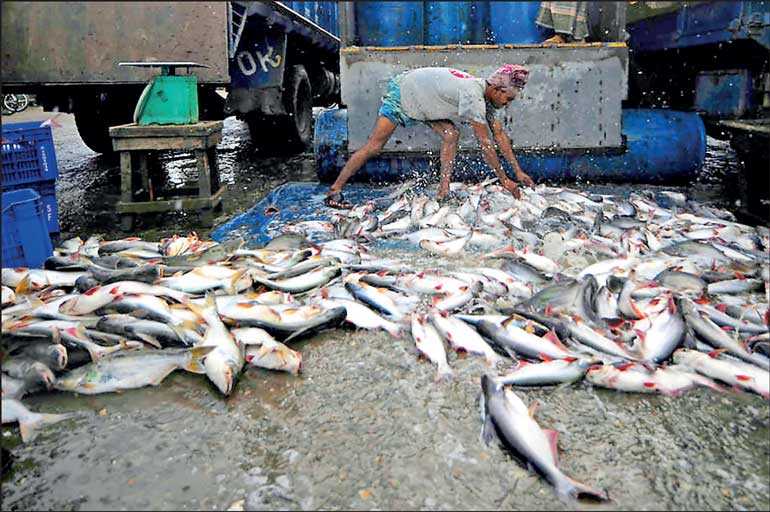
Wholesale fish market
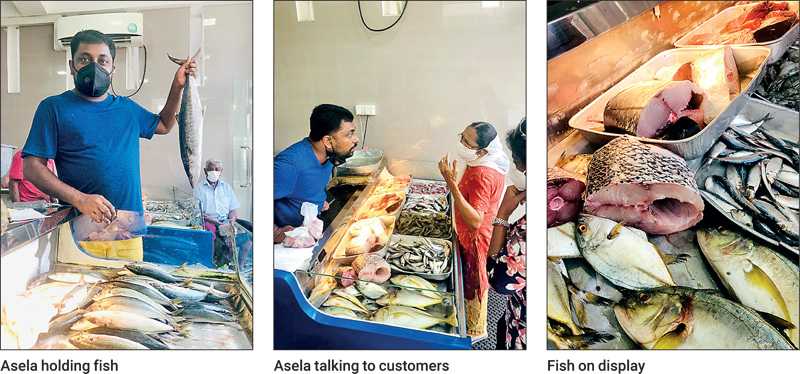
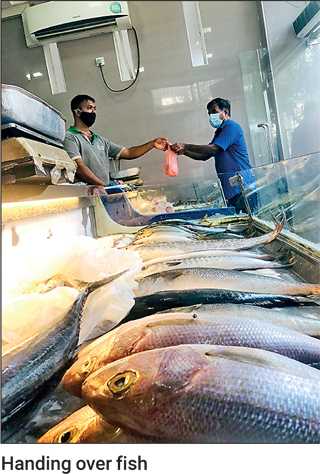 Text and pix by Nirasha Piyawadani
Text and pix by Nirasha Piyawadani
“Normally during the Christmas season there is a great demand for squid. During the month of December, I have sales of at least about Rs. 3,000 for a day. But this year my sales are down about 60%. People are afraid to buy fish. If a person has the coronavirus, it will be present on everything he touches, not only fish. So why be afraid only about purchasing fish? If fish is cooked and eaten would a person get the virus? This is an unfounded fear!”
“I have taken a loan from the bank. With this prevailing situation I have great difficulty in repaying that loan. There are many fish vendors who have greater problems. We keep hoping that in about two months these problems will get solved.”
“Though permission has been given to open the Peliyagoda Fisheries Complex, permission has not been given for the general public to come there are purchase fish. Only wholesale merchants can purchase fish from there.”
Chaminda Asela, resident of Rajagiriya, who has been in the retail fish business for the last 21 years described the challenge he faces due to the COVID-19 virus. Chaminda’s complaints are a mirror of the complaints of fishmongers countrywide who share the same fate.
Towards the end of last October, the discovery of a cluster of coronavirus patients at the Peliyagoda Fisheries Complex, gave rise to a fear among the general public, that consuming fish would cause the spread of the virus. This unfounded fear was fostered by rumour, causing many to refrain from purchasing fish for their daily consumption. This in turn affected the country’s economy, had a direct bearing on the fisheries industry and an adverse effect on the fish vendors.
But are these rumours that consuming fish can cause coronavirus true? This article is based on reports of studies accepted worldwide, and specialist views based on researched analysis of unfounded rumours.
The coronavirus cluster discovered at the Peliyagoda Fisheries Complex
On 21 October, the discovery of about 40 individuals who tested positive for coronavirus, caused the Government to issue an order for the temporary closure of the Peliyagoda Fisheries Complex.
The Chief Epidemiologist of the Epidemiology Unit Dr. Sudath Samaraweera stated on that occasion that if the COVID virus infests the surface of the fish, it may persist for some time, but there is no need to be afraid to eat cooked fish following safe hygiene practices.
But by then the virus had spread to several major fishing harbours and fishing markets in the country. Media reveals that the port management had taken steps to close the Beruwala Fishing harbour due to the COVID infection of 10 drivers and helpers of lorries carrying fish to the Peliyagoda Fisheries Complex from Beruwala on 22 October.
The Peliyagoda Fisheries Complex was visited by fishmongers and consumers from many parts of the country and the spread of the virus to other parts of the country could not be prevented. Accordingly, the health sector was able to locate infected people from different parts of the country such as Madampe, Kahawatta, Ratnapura, Homagama, Panadura and this series of incidents created fear among the people to buy fish.
Rumours spread more rapidly than the virus
Due to this fear, the myth that eating fish could infect the corona rumour spread rapidly and on social media.
Fisherman Nihal Fernando commented on a report on the BBC Sinhala website on 29 October that he was in a desperate situation as he could not sell his fish harvest. This is how he described the situation: “Come to the Chilaw Jetty if you can. There are hundreds of thousands of big fish in my boat only, all seer fish (thora maalu), para fish (para maalu), yellow fin tuna (kelawallo maalu). These days we have been eating those fishes. As far as I know, there are more than 500,000 kilos of fish in multi-day fishing trawlers in several areas, including the south and east. We can’t keep these fish any longer. This corona wave came not from fishermen but from businessmen, none of our fishermen had corona. But the Government did not implement a program to make the people aware of it.
Meanwhile, at a press conference held at this party office on 18 November, former Minister of State for Fisheries Dilip Wedaarachchi said, “Don’t be afraid to eat these fish. No corona disease develops. See, we eat these raw fish.” He requested people not to be afraid to eat fish while eating raw fish in front of the media. This statement attracted the attention of the foreign media as well.
According to the official website of the Department of Fisheries and Aquatic Resources, the number of people who make a living directly and indirectly from the fishing industry is close to two million. According to the 2018 Annual Performance Report of the Department of Fisheries and Aquatic Resources, the total fish production in the year 2018 was 527, 060 metric tons and contributed to the harvesting of 439,370 metric tons and 87,690 metric tons of fish in sea water and freshwater respectively. According to the Central Bank of Sri Lanka Report 2019, the contribution of the fishing industry to the GDP of Sri Lanka is 1.1%, and in 2018 the figure was 1.2%.
“There is no scientific evidence that eating fish can cause corona infection”: An official announcement from the Ministry of Health
On 24 October, the Ministry of Health and the Epidemiology Unit issued an official statement that no scientific evidence had been found that fish consumption could cause corona infection and therefore, people should not be afraid to eat fish. Theoretically, the COVID-19 virus can remain on any surface, thus, fish and hands should be thoroughly washed and cleaned. Avoid touching the face while preparing fish for cooking or storage. It further stated that the equipment and hands used for this purpose should be thoroughly cleaned with soap.
Due to the revelations made to the media from time to time by fishermen and fishmongers, it was revealed that it was not enough to allay the fears of people to come to buy fish as usual, and because of that the harvest was wasted in bulk.
Can the COVID virus actually infect human through fish consumption?
We explored the scientific evidence that has been uncovered locally and internationally. We also inquired about this from Specialist Dr. Sudath Samaraweera, Chief Epidemiologist, Epidemiology Unit, and he stated that no health sector has yet scientifically confirmed that the COVID virus can infect humans through fish consumption. He further stated, although a formal report has not yet been released after conducting a formal investigation into this, the data obtained from the day-to-day methods based on experience and evidence can be used to control COVID-19.
“The virus dies when the skin is removed and cooked at a certain temperature. Currently COVID-19 has been identified as a respiratory tract infection, not as a disease that can be transmitted through the digestive tract.”
When we asked if there is a risk in eating raw fish such as sushi without cooking, Dr. Samaraweera said, “People who like to eat raw fish may think that there is a possibility of getting infected when fish is eaten raw, the virus will accumulate in the throat and cause the infection. Logically it is possible to think, but so far it has not been medically proven that the virus can be transmitted in that way. Thus, no such incident has been reported.”
“Not only COVID-19 but any virus stays on the surface for some time. At present we only have information on corona from research and data from less than a year. Because of this we cannot comment 100% specific ideas on the virus. Therefore, it is important to be careful. There is no risk of eating fish cleaned by following proper health instructions.”
According to the World Health Organisation
The World Health Organisation has clarified on its official website under COVID-19, clear actions have been taken under several aspects of food security. It explains whether COVID-19 can be absorbed by eating cooked foods/animal meat products as follows;
Currently no evidence has been found that food can infect humans with COVID-19. The COVID-19 virus also can be killed at a temperature that can kill other bacteria and viruses in the food. Foods such as chicken and eggs should always be thoroughly cooked to at least 700C. Avoid keeping raw meats and cooked foods together and from that virus can be prevented circulating in cooked foods.
United Nations Food and Agriculture Organisation (FAO) report on the impact of COVID-19 on the Fisheries and Aquatic food system in Asia
One month after the World Health Organisation declared COVID-19 as a pandemic, on 21 May, the Food and Agriculture Organisation of the United Nations Organisation released an official report on the impact of COVID-19 on fisheries and aquatic food systems in some Asian countries.
While those policies are briefly within global scope, the situation in some Asian countries has been analysed. This article provides an update on new data development and observations.
The report released by the Relief Website of the United Nations Office for the Coordination of Humanitarian Affairs states that fish is a key component of a healthy diet and is safe to eat.
It further states that misleading beliefs and sentiments in some countries due to the pandemic have led to a reduction in fish consumption. Yet it was emphasised that vertebrates, aquatic animals such as finfish, reptiles, amphibians, and invertebrates like molluscs do not play an epidemiological scientific role in the transmission of COVID-19 on humans.
The reports point out that the fisheries products too can be contaminated in the same way the virus transmitted on the surface of any product, if it is handled by the people who do not follow proper hygienic precautionary measures.
It says for this reason, it is important to implement strong sanitation practices to protect fishermen and aquaculture workers and fish products from the virus.
Foreign research reports on the relationship between COVID-19 and food
On 22 August, the American Center for Disease Control and Prevention (CDC) also posted a detailed report with data on this topic on its official website. The Center for Disease Control and Prevention (CDC) is a United States National Institutes of Public Health, and it is a US Federal agency operating under the Department of Health and Human Services, with headquarters located in Atlanta, Georgia.
The CDC report states that it has not been confirmed through any scientific evidence that the COVID-19 virus was ingested to a human body from seafood or meat yet.
According to the Food and Coronavirus Disease 2019 (COVID-19) Report, the highest probability of transmission of this virus is from human to human, and the report states that although the virus can be transmitted from the human body to food and food packaging, the risk of contracting the virus is very low.
The report states that despite the large number of employees working in the food and packaging sector no country in the world has reported cases of the virus.
The CDC report further confirms the report issued by the Ministry of Health that there is no risk of contracting the virus, and it can be avoided following healthcare practices, by avoid touching the nose, mouth or eyes when preparing/cooking food, and eating healthy clean diet.
Also, the report mentioned that different temperature capacities can be used in cooking different foods such as meat and fish as well as vegetables. It is recommended that the temperature for cooking seafood, including fish, is 145 degrees Fahrenheit, and the fish and meat is advised to cook until the meat is easily shredded.
It was further recommended use of a food thermometer to test for yourself whether the temperature used in cooking food destroys the germs that can cause food poisoning.
This will confirm that the idea that eating fish can cause corona infection is a myth, which has been widely circulated on social media as well as among the general public. This is a scientifically proven misconception.
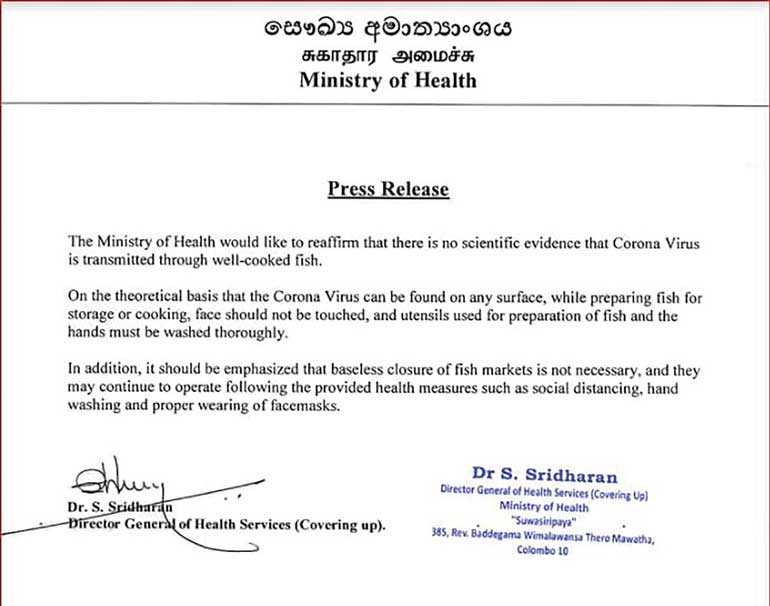
Ministry of Health statement that no scientific evidence had been found that fish consumption could cause corona
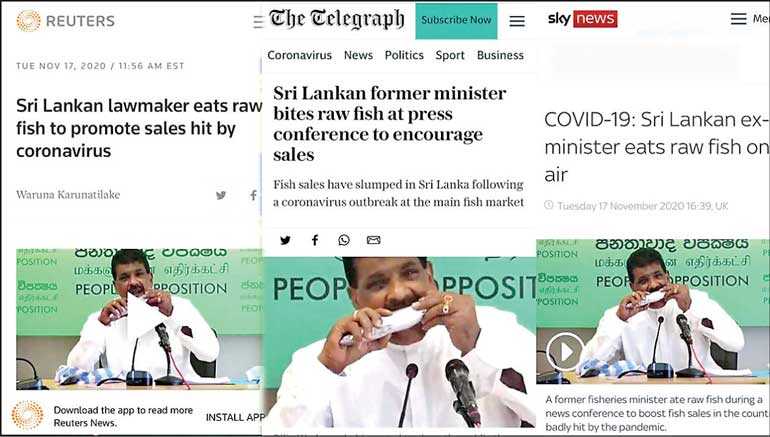
Former Minister of State for Fisheries Dilip Wedaarachchi eating raw fish
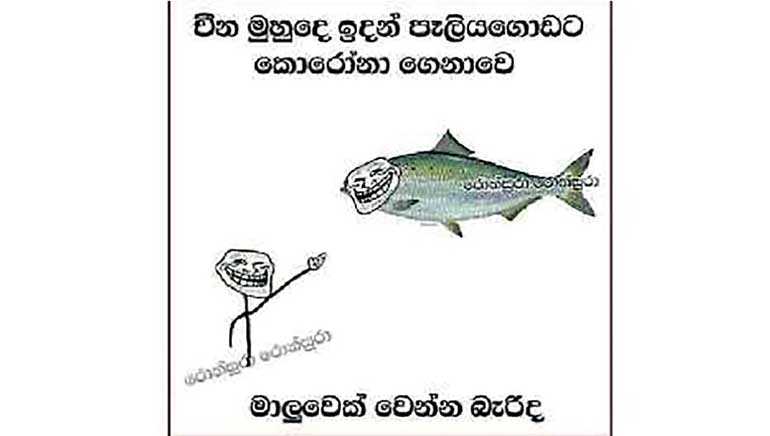
A rumour that eating fish could infect one with the coronavirus spread rapidly and on social media